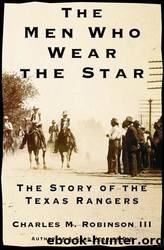The Men Who War the Star: The Story of the Texas Rangers by Charles M. Robinson III

Author:Charles M. Robinson III [Robinson, Charles M. III]
Language: eng
Format: epub
Tags: Fiction
ISBN: 9780375505355
Publisher: Random House Inc
Published: 2000-12-08T06:00:00+00:00
Chapter 12
The Rise of McNellyâs Rangers
The Mason County War was just one of the âdifficultiesâ that caused the decade of the 1870s to be known in Texas as âthe Terrible Seventies.â There were many others, such as the Jaybird-Woodpecker Feud in Fort Bend County just south of Houston, the Horrell-Higgins Feud in Lampasas County northwest of Austin, and the Shackelford County Feud northeast of Abilene. They left in their wake broken families and painful memories. Most terrible of all was DeWitt Countyâs notorious Taylor-Sutton Feud, which, over the course of thirty years, left scores of people dead and prompted the legislature to create a special unit of peace officers âto assist the civil officers of DeWitt county in enforcing quiet and obedience to the law in that desperado ridden section.â¹
Although the new unit ultimately was absorbed into the regular Ranger Service, initially it was designated Washington County Volunteer Militia Company A. Informally, it was known as the Special Force, Texas State Troops, and McNellyâs Rangers after its commanding officer, Capt. Leander H. McNelly. Whatever its name, the special unit functioned as a ranging company that answered to Adjutant General Steele, and the men of the Washington County Volunteer Militia considered themselves Rangers. Like those of the Frontier Battalion, they were professional, full-time lawmen, and Captain McNelly was an experienced peace officer.²
A Virginian, Leander McNelly was about sixteen years old when he came with his family to Texas in 1860. During the war he served with Confederate forces in New Mexico and Texas and as a captain of scouts in Louisiana, where he gained a reputation as a tenacious fighter. George Durham, who served under McNelly as a Ranger, and whose father had served under him as a Confederate, described the tactics that were his hallmark: âGeneral [Robert E.] Lee made his plans first and then fought. . . . Captain McNelly made his plans like a chicken hawkâafter he had located his target and was coming in for the kill.â³
When the war ended, McNelly married and farmed near Brenham in Washington County, about midway between Austin and Houston. On July 1, 1870, he became one of four captains in Davisâs Texas State Police, despite his hatred of the governorâs Reconstruction regime. His reasons were obscure, but it has been suggested he accepted the position at the urging of friends, who perhaps believed that the best way to protect themselves was to have one of their own in command of a force that might oppress them. Whatever the motive, he soon established a reputation for integrity, although his determination to enforce the lawâincluding the Reconstruction edictsâcost him some public confidence. Nevertheless, when the time came to appoint an officer to handle the trouble in DeWitt County, McNellyâs experience and character made him the logical choice.4
Physically, McNelly was thin and frail, his naturally slight build wasted by tuberculosis. When he took command of the new unit he already was a dying man, which makes his career all the more remarkable. Soft-spoken and
Download
This site does not store any files on its server. We only index and link to content provided by other sites. Please contact the content providers to delete copyright contents if any and email us, we'll remove relevant links or contents immediately.
| Africa | Americas |
| Arctic & Antarctica | Asia |
| Australia & Oceania | Europe |
| Middle East | Russia |
| United States | World |
| Ancient Civilizations | Military |
| Historical Study & Educational Resources |
Magic and Divination in Early Islam by Emilie Savage-Smith;(1197)
Ambition and Desire: The Dangerous Life of Josephine Bonaparte by Kate Williams(1087)
Operation Vengeance: The Astonishing Aerial Ambush That Changed World War II by Dan Hampton(986)
What Really Happened: The Death of Hitler by Robert J. Hutchinson(871)
London in the Twentieth Century by Jerry White(848)
Time of the Magicians by Wolfram Eilenberger(844)
Twilight of the Gods by Ian W. Toll(813)
The Japanese by Christopher Harding(803)
Papillon by Henry Charrière(796)
Lenin: A Biography by Robert Service(780)
The Devil You Know by Charles M. Blow(779)
Twelve Caesars by Mary Beard(769)
Freemasons for Dummies by Hodapp Christopher;(749)
The Churchill Complex by Ian Buruma(731)
Napolean Hill Collection by Napoleon Hill(706)
The Enlightenment by Ritchie Robertson(693)
Henry III by David Carpenter;(690)
Bohemians, Bootleggers, Flappers, and Swells: The Best of Early Vanity Fair by Bohemians Bootleggers Flappers & Swells- The Best of Early Vanity Fair (epub)(688)
The Rise and Triumph of the Modern Self by Unknown(659)
